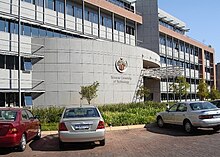 | |
| Motto | We empower people |
|---|---|
| Type | Public university of technology |
| Established | 1 January 2004 (Formed as a result of a merger of three established institutions) |
| Chancellor | Gloria Tomatoe Serobe[1] |
| President | Khoza Shepherd |
| Vice-Chancellor | Tinyiko Samuel Maluleke |
Academic staff | c. 755 |
Administrative staff | 4,800 |
| Students | c. 65,000 |
| Location | South Africa 25°43′56″S 28°09′43″E / 25.7322°S 28.1619°E |
| Campus | nine campuses, mostly urban |
| Colours | Blue, red, gold |
| Nickname | TUT |
| Affiliations | HESA[2] NADEOSA[3] |
| Website | www |
Tshwane University of Technology (TUT; Afrikaans: Tshwane-Universiteit vir Tegnologie) is a higher education institution in South Africa that came into being through a merger of three technikons — Technikon Northern Gauteng, Technikon North-West and Technikon Pretoria.
As the number of students registering annually grows rapidly, records show that Tshwane University of Technology caters for approximately more than 60,000 students and it has become the largest residential higher education institution in South Africa.[4]

Campuses
[edit]

The university occupies nine campuses: Pretoria main campus, arcadia campus, arts campus, Soshanguve south and Soshanguve north campus, Ga-Rankuwa campus, Witbank (eMalahleni campus), Mbombela (Nelspruit) and Polokwane. Two faculties, namely the Faculties of Science and The Arts, have dedicated campuses in the Pretoria city centre.[5]
Student enrollment
[edit]There were 88,078 students enrolled for the year 2012 at the Tshwane University of Technology. It was estimated, for the year 2014, that the number of first year student applications the university received were around 80,000. Tshwane University of Technology predominantly provides vocational qualifications in the form of three-year diplomas. Additional options exist in the form of advanced diplomas, postgraduate and masters and doctoral degrees. Students can track the TUT application status. These qualifications are offered through the following faculties:
- Faculty of Arts and Design
- Faculty of Science
- Faculty of Engineering and the Built Environment
- Faculty of Information and Communication Technology (ICT)
- Faculty of Humanities
- Faculty of Economics and Finance
- Faculty of Management Sciences (including Business School)
Ranking
[edit]In 2010 Webometrics ranked the university the 15th best in South Africa and 5662th in the world.[6] In 2018, the university ranked ninth best university in South Africa.

The United Nations Educational, Scientific and Cultural Organisation (UNESCO) ranks the university's Department of Journalism as one of twelve Potential Centres of Excellence in Journalism Training in Africa.[7][8]
| TUT Times Higher Education Ranking 2019 to 2024 | |
|---|---|
| Year | World Rank |
| 2024 | 1201–1500 |
| 2023 | - |
| 2022 | 1001–1200 |
| 2021 | 1001+ |
| 2020 | 801–1000 |
| 2019 | 801–1000 |
| [9][10][11][12][13][14][15][16][17][18][19] | |
See also
[edit]References
[edit]- ^ "Tshwane University of Technology - Gloria Serobe: Installed as the 4th TUT Chancellor". www.tut.ac.za. Retrieved 2 May 2024.
- ^ "Higher Education South Africa". www.usaf.ac.za. HESA. Archived from the original on 4 August 2009. Retrieved 9 July 2021.
- ^ "National Association of Distance Education Organizations of SA". www.nadeosa.org.za. Retrieved 9 July 2021.
- ^ "Tshwane University of Technology - NOMINATIONS/APPLICATIONS". tut.ac.za. Retrieved 2 May 2024.
- ^ sarua-admin3. "Home". SARUA. Retrieved 22 June 2024.
{{cite web}}: CS1 maint: numeric names: authors list (link) - ^ "Top Africa". Ranking Web of World Universities. Archived from the original on 4 October 2009. Retrieved 26 February 2010.
- ^ "Archived copy" (PDF). Archived from the original (PDF) on 4 March 2016. Retrieved 12 December 2011.
{{cite web}}: CS1 maint: archived copy as title (link) - ^ "Archived copy". unesdoc.unesco.org. Archived from the original on 14 May 2023. Retrieved 29 May 2023.
{{cite web}}: CS1 maint: archived copy as title (link) - ^ "World University Rankings 2024 (South Africa)". Times Higher Education (THE). 20 October 2024. Retrieved 27 February 2024.
- ^ "World University Rankings 2023 (South Africa)". Times Higher Education (THE). 20 October 2023. Retrieved 27 February 2024.
- ^ "World University Rankings 2022 (South Africa)". Times Higher Education (THE). 20 October 2022. Retrieved 27 February 2024.
- ^ "World University Rankings 2021 (South Africa)". Times Higher Education (THE). 20 October 2021. Retrieved 27 February 2024.
- ^ "World University Rankings 2020 (South Africa)". Times Higher Education (THE). 20 October 2020. Retrieved 27 February 2024.
- ^ "World University Rankings 2019 (South Africa)". Times Higher Education (THE). 20 October 2019. Retrieved 27 February 2024.
- ^ "World University Rankings 2018 (South Africa)". Times Higher Education (THE). 20 October 2018. Retrieved 27 February 2024.
- ^ "World University Rankings 2017 (South Africa)". Times Higher Education (THE). 20 October 2017. Retrieved 27 February 2024.
- ^ "World University Rankings 2016 (South Africa)". Times Higher Education (THE). 20 October 2016. Retrieved 27 February 2024.
- ^ "World University Rankings 2015 (South Africa)". Times Higher Education (THE). 20 October 2015. Retrieved 27 February 2024.
- ^ "World University Rankings 2014 (South Africa)". Times Higher Education (THE). 20 October 2014. Retrieved 27 February 2024.